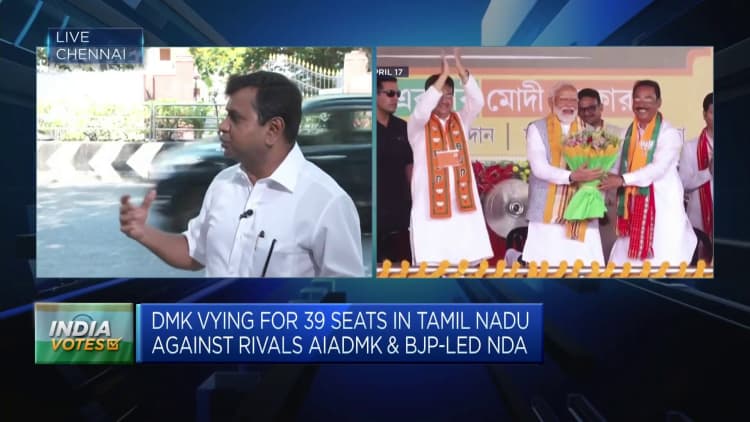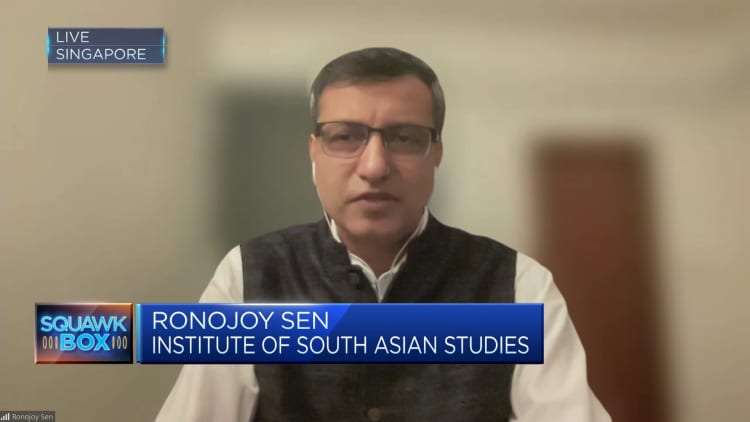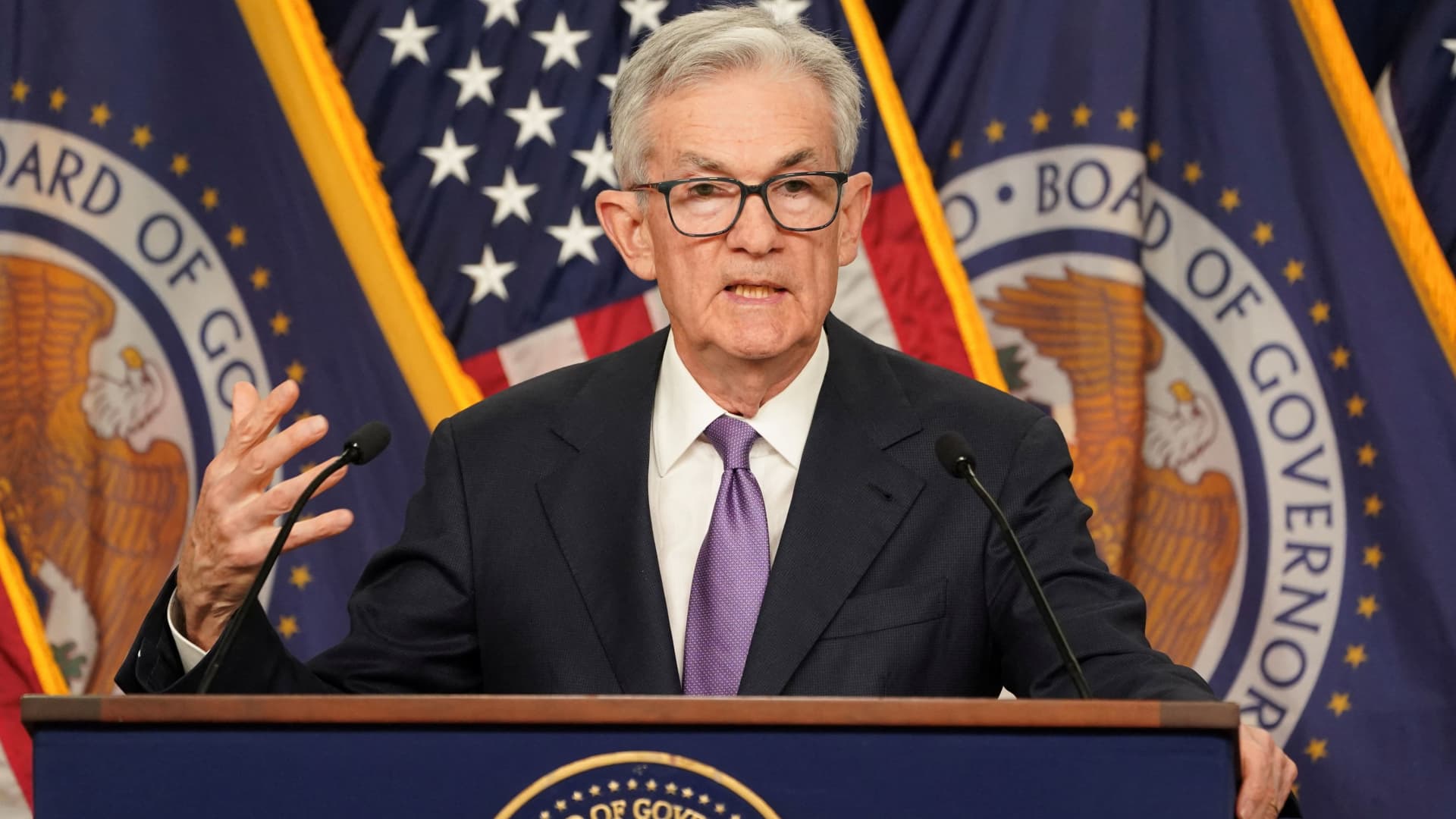
Narendra Modi, India’s prime minister, center, during a campaign rally in Agra, Uttar Pradesh, India, on Thursday, April 25, 2024. Modi doubled down on his attacks on the main opposition party, using language to denounce the Hindu majority and Muslim minority. Photographer: Prakash Singh/Bloomberg via Getty Images
Bloomberg | Bloomberg | Getty Images
A decade after coming to power, India’s Prime Minister Narendra Modi appears poised to secure a rare third term in office as general elections are now underway.
Under his rule, India’s economic growth has been robust and its geopolitical standing in the world has increased.
But observers and critics say the country has also seen signs of democratic backsliding, which has become clear under his leadership.
“Modi has portrayed himself as an East Asian strongman,” Asim Ali, an independent political researcher in New Delhi, told CNBC.
He was also called “the high priest of India” – he was above everything that concerned politics, Ali added. “This is very worrying as the mixing of religious nationalism with economic development” has been a “central feature” of his government.
In its latest report for 2024, the Sweden-based V-Dem Institute said a third Modi term could worsen the political situation “given the already significant democratic decline under Modi’s leadership and the ongoing crackdown on minority rights and civil society.”
US research group Freedom House said India’s elections would take place in a media landscape marked by increasing “legal attacks on critical journalists” and news outlets.
There is no doubt that under Modi, the “space for democracy has shrunk between elections,” Milan Vaishnav, South Asia director at the Carnegie Endowment for International Peace, told CNBC.
“Today, the liberal character of Indian democracy is less evident,” he added, “with increasing majoritarianism, weaker checks on executive power and growing intolerance of dissent.”
Last year, the government criticized a BBC documentary that questioned Modi’s alleged role in the deadly 2002 Gujarat riots and blocked clips of it from being published on social media platforms.
Many mainstream Indian media, especially the Hindi-language media, have been “co-opted” to spread propaganda to spread “the government’s message,” Ali said.
India shuts down the internet more often than any other country, and authorities often use such tactics to contain political protests and suppress criticism, human rights groups say.
In a recent Newsweek interview, Modi addressed the issues and called India the “mother of democracy.”
“Our media plays an important role in this regard,” he said, dismissing claims of “restriction on media freedom” in India as “dubious”.
The Prime Minister’s Office and the ruling Bharatiya Janata Party did not respond to CNBC’s request for comment.
“Witch hunt” by the opposition
Ahead of the election, India’s main opposition party – the National Congress Party – accused the Modi government of freezing its bank accounts.
“This is a criminal action by the Prime Minister and the Home Minister against the Congress party,” Congress leader Rahul Gandhi said in a sharp attack.
“It is being staged to paralyze us before the elections,” he claimed, adding that the people were being “robbed of their constitution and democratic structure.”
The Modi government rejected the opposition’s allegations.
Previous governments also conducted “a witch hunt against opposition politicians,” said Chietigj Bajpaee, senior research fellow for South Asia at Chatham House.
But the scale of the Modi government’s “actions” make them even more alarming as it has “used key levers of power” to intimidate opponents, he added.
India’s Supreme Court recently granted interim bail to jailed Delhi Chief Minister Arvind Kejriwal, a vocal political rival of Modi who was arrested in March in a bribery case. The arrest caused a stir because he was the leader of India’s Aam Aadmi Party, a key player in a larger opposition alliance.
The timing is “unusual” as it comes shortly before the elections, Bajpaee said. It appears that the government wants to “leave no stone unturned” in its stated aim of securing 400 seats in the Lok Sabha, or lower house of Parliament, he added.

Get a weekly roundup of India news in your inbox every Thursday.
Subscribe now
“Pro-Hindu Party”
Over the past decade, Modi’s BJP has emboldened itself to push its Hindu nationalist ideology, analysts say. The aim was to consolidate support among Hindus, who make up 80% of the country’s 1.4 billion population.
“The BJP is an avowedly pro-Hindu party,” Vaishnav said. Since coming to power in 2014, but especially after 2019, it has “tried to use laws, regulations and even civil society to advance its agenda,” he added.
Pedestrians watch as a screen broadcasts footage of an inauguration ceremony for the Ram Temple in Ayodhya attended by Prime Minister Narendra Modi at a public venue in New Delhi, India, Monday, January 22, 2024. Modi fulfilled his party’s decades-long goals: a long-standing promise by inaugurating a major Hindu temple in northern India. Photographer: Prakash Singh/Bloomberg via Getty Images
Bloomberg | Bloomberg | Getty Images
In January, Modi inaugurated a controversial temple in the city of Ayodhya – on the site where an ancient mosque was demolished by a Hindu mob – fulfilling a decades-long campaign promise.
“The temple issue would be significant in the Hindi-speaking area, especially to strengthen the Hindu base,” Ali said, adding that the government had also used “anti-Muslim” rhetoric during the election campaign.
Modi was recently accused of hate speech after he reportedly called Muslims “infiltrators” at a rally, which was seen as undermining India’s secular constitution.
The Modi government’s “discussion of establishing a ‘Hindu Rashtra’ or nation suggests ambitions to eliminate the gap between state and religion,” Bajpaee noted, warning that it “could undermine India’s secular credibility “.
Cult-like status?
Nevertheless, the public backlash against Modi’s hardliner rule was limited. His charisma and personality have made him incredibly popular at home and abroad.
“There is no one in the opposition who can match this popularity,” Ronojoy Sen, a research fellow at the Institute of South Asian Studies, said in a recent CNBC interview.
Political observers argue Modi has benefited from a cult-like status created around him – supported by the ruling party’s formidable electoral machinery – to create a direct connection between him and voters.
For those dissatisfied with the country’s direction, “voting out the BJP means they have to get rid of Modi,” said Neelanjan Sircar, senior fellow at the Center for Policy Research in New Delhi. That will be “difficult if voters identify with him.”

His populist appeal has endured despite India’s deep-rooted economic problems such as rising youth unemployment and growing wealth inequality.
A CSDS-Lokniti pre-poll showed Modi leading in popularity, with 48% of respondents choosing him as their candidate for prime minister compared to his opposition rivals.
India’s economic progress was “apparently no worse before Modi came along,” Sircar noted. “Even in Manmohan Singh’s time, India grew very quickly,” he added, pointing to the economic reforms under the former prime minister in the 1990s.
“What has changed is the way everything is branded in Modi’s image.”
Even the BJP’s manifesto is called “Modi-Ki Guarantee” – or Modi’s Guarantee, Sircar pointed out, adding that the entire political system is “oriented towards positive attribution to the top”.
‘Big changes’
With election results due in early June, the prime minister and the BJP were widely expected to win a third term given India’s weak opposition.
A re-elected Modi government will be “more vigorous” in pushing forward “politically sensitive economic reforms and its more divisive identity-focused agenda,” Chatham House’s Bajpaee said.
In a recent interview, Modi exuded confidence and said he wanted to make India the “third economic superpower”, outlining his bold vision.
The Indian leader will “flex his muscles” to enact significant legislation on a strengthened mandate, Carnegie’s Vaishnav added.
“Modi has already prepared voters to expect ‘big changes’ once they are back in power,” he added.
Source link
2024-05-17 10:05:08
www.cnbc.com














